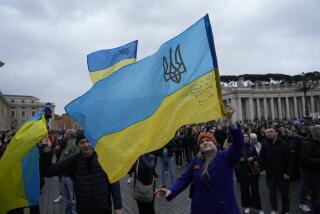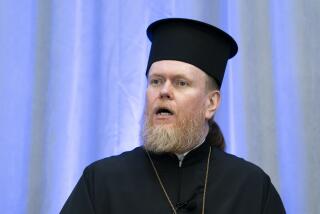Archbishop Selected for Vatican-Kremlin Talks : Religion: The Pope gets ‘a close collaborator’ to follow up on his meeting with Gorbachev.
- Share via
VATICAN CITY — Delicate maneuvering is under way along the hushed corridors of Vatican diplomacy in the aftermath of the momentous meeting here between Pope John Paul II and Soviet President Mikhail S. Gorbachev.
Normally, reshuffles in the Curia that administers the Roman Catholic Church attract only insiders’ attention, but the reassignment of a senior diplomat last week proved an exception: The Vatican made plain that he would play a key role in an intricate process of repairing historic enmities between Christianity and communism.
Archbishop Edward Cassidy, a 65-year-old Australian who had been No. 2 in the Vatican’s secretariat of state, was named president of the Council for Promotion of Christian Unity. As such, Cassidy will represent the Vatican at negotiations with the Russian Orthodox Church over renewed rights for long-suppressed Catholics in the Ukraine.
The rights of several million Oriental-rite Catholics in the Ukraine who have preserved their faith and maintained their allegiance to Rome despite four decades of official prohibition is fundamental to Vatican-Kremlin rapprochement.
In a historic encounter of Slavs earlier this month, Gorbachev promised the Pope that there would be full restoration of religious freedom throughout the Soviet Union. Already Catholic hierarchies are being re-established and churches reopened in the Baltic republics and Byelorussia.
Gorbachev also invited John Paul to visit the Soviet Union, an invitation the Pope dearly sought. But he stopped short of accepting outright. The two leaders also agreed to restore official links between Moscow and the Holy See, broken after the victory of the October Revolution in 1917. Vatican and Soviet diplomats are discussing at what level the new ties should be established. Initially they will probably stop short of full diplomatic relations.
As far as the Soviet government is concerned, religious freedom will be assured with passage by the Supreme Soviet early in 1990 of a new law guaranteeing freedom of conscience. In the Vatican’s view, the real test will come in the religiously contentious Ukraine.
On the eve of the new legislation, Soviet officials in the Ukraine are allowing so-called Uniate Catholics to officially register for the first time since their church was abolished by Josef Stalin in 1946. Suppression brought arrest for all seven bishops and many of the Ukraine’s 2,211 priests.
At the end of World War II, there were 4.5 million Uniates in the Ukraine. Their church had 2,156 parishes, 195 houses for religious orders, three seminaries and a theological academy, and ran 9,900 schools.
Stalin forcibly folded the Uniates into the government-approved and government-obedient Russian Orthodox Church, which broke with Rome in the 11th Century. By Vatican estimate, most of the 3 million to 4 million Catholics in the Ukraine today attend Orthodox services. A minority are “catacomb” Catholics who, along with about 500 priests and their bishops--some of them unknown to Rome--have practiced their faith clandestinely.
Enactment of the pending legislation will effectively transfer the Ukraine question from a Vatican-Kremlin issue to a Vatican-Orthodox question. That is where Cassidy comes in as successor to retiring 80-year-old Dutch Cardinal Johannes Willebrands. In announcing Cassidy’s promotion, the Vatican said bluntly that the Pope wanted “a close collaborator” in the Christian unity post.
Cassidy, a diplomat, must negotiate new rules of the game with an Orthodox church that has much to lose with Uniate freedom: a part of its flock, some of its priests and a large number of pre-Stalinist Catholic churches.
Sensing a turning tide, Uniates were vigorously lobbying for the return of about 80 churches in the western Ukraine even as Gorbachev headed for the Vatican. A Vatican-Orthodox meeting scheduled for earlier this month was canceled after protesting Uniates began a vigil for the return of a church in the Ukrainian city of Lvov. An Orthodox spokesman denounced the vigil as an occupation.
An Orthodox patriarch accompanying the official Soviet party on its visit to Italy bypassed Gorbachev’s stop at the Vatican, warning that his church would not negotiate the transfer of property “at the muzzle of a gun.”
Cassidy assumes his new post with his eyes open. He told an interviewer before his appointment was announced: “The Orthodox Church has expressed its hopes for a peaceful development, that there would not be violence and confrontation or aggressive attitudes. I think we are all anxious that that should be the case. We don’t want this to develop into a religious struggle but rather as sister churches working out their problems in dialogue and Christian brotherhood.”
What the Vatican seeks in the Ukraine and elsewhere in Gorbachev’s changing Soviet Union is the ability to name bishops, to have them establish their sees in free communication with Rome and to oversee congregations that worship in their own churches. If that happens, Vatican sources say, John Paul will quickly accept Gorbachev’s invitation to visit, perhaps as early as 1992.
More to Read
Sign up for Essential California
The most important California stories and recommendations in your inbox every morning.
You may occasionally receive promotional content from the Los Angeles Times.










